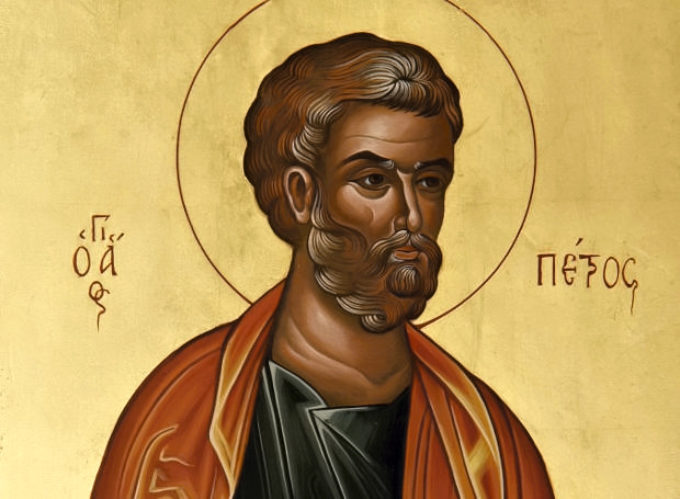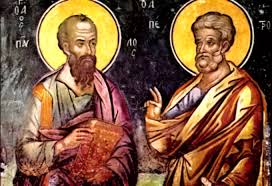The Romans theologians place the trip to Rome made by Apostle Peter around the year 41 after Christ, meaning in the second year of the reign of Claudius, saying that he stayed in Rome for 25 years, till 66 when he suffered martyrdom under Nero.
Let’s see first if things are the way they say and if what they assert is in accordance with the facts related by the Holy Scripture. For proving the truth, we shall have recourse to the historical account of Luke the evangelist about the missionary trips of Apostle Paul where we come know the two apostles and their epistles. These epistles will reveal the time when the two apostles met, the places where took place their meetings and if Peter went to Rome or not in this period of time. Apostle Paul returned to Christ around 37, after three years (Galatians 1, 18) he went to Jerusalem to meet Peter and he stayed there 15 days; thus their first meeting took place in Jerusalem in 39. Apostle Paul undertakes a second journey to Jerusalem leaving Antioquia with Barnaba for bringing the alms of the Christians given to the poor from Judea The disciples, as each one was able, decided to provide help for the brothers and sisters living in Judea. This they did, sending their gift to the elders by Barnabas and Saul.(Acts 11, 30; 12, 25).
This period coincides with the famine taking place during the reign of Claudius in the time of the governors of Judea, Cuios Fados and Tiberius Alexander, around 44-45. Forwards in the Acts are related the following facts (12, 1-3):
It was about this time that King Herod arrested some who belonged to the church, intending to persecute them. He had James, the brother of John, put to death with the sword. When he saw that this met with approval among the Jews, he proceeded to seize Peter also. This happened during the Festival of Unleavened Bread.
So around the year 45, Peter was still in Judea. Paul says in his epistle to the Galatians (2, 1-2):
Then after fourteen years, I went up again to Jerusalem, this time with Barnabas. I took Titus along also. I went in response to a revelation and, meeting privately with those esteemed as leaders, I presented to them the gospel that I preach among the Gentiles. I wanted to be sure I was not running and had not been running my race in vain.
In the Acts is related this trip undertaken by Paul to Jerusalem, account where it is mentioned its second reason: the issue of receiving the new adepts after being circumcised
`After much discussion, Peter got up and addressed them: “Brothers, you know that some time ago God made a choice among you that the Gentiles might hear from my lips the message of the gospel and believe. God, who knows the heart, showed that he accepted them by giving the Holy Spirit to them, just as he did to us. He did not discriminate between us and them, for he purified their hearts by faith. Now then, why do you try to test God by putting on the necks of Gentiles a yoke that neither we nor our ancestors have been able to bear? No! We believe it is through the grace of our Lord Jesus that we are saved, just as they are.` (15, 7-21).
So Peter was in Judea even 14 years after his first meeting with Paul when Paul stayed at him for 15 days. Then he came to Antioch where he was rebuked by Paul. According to what it is related in the Acts (chapters 18-21), Paul went back to Jerusalem and embraced the Church but there it is not mentioned any apostle he could have met but it is accounted that he met the while Church. And since very reputed exegetes view the trip related in the Galatians (2, 1) identical with the trip from the Acts (18, 21), and since in the epistle to the Galatians 2,9 it is written
James, Cephas and John, those esteemed as pillars, gave me and Barnabas the right hand of fellowship when they recognized the grace given to me. They agreed that we should go to the Gentiles, and they to the circumcised.
, it results the fact that Peter was in Jerusalem after 14 years from his first meeting with Paul. Thus according to the first and second account Peter was in Jerusalem around the year 53.
In addition to this, by the second variant of their previous meeting from the Acts 11, 30; 12, 25, it is testified the fact that Peter stayed permanently in Jerusalem and the area of Judea.
In 58 it is written the epistle to the Romans, where Peter is not mentioned at all, thing which might be unacceptable if we assume that Peter was in Rome. But it had been already proven that he wasn’t. In the year 60 Paul went to Jerusalem for the last time and he was there on Pentecost and stayed till the spring of the third year 62-63. Here is what Luke writes about this in the Acts:
When we arrived at Jerusalem, the brothers and sisters received us warmly. 18 The next day Paul and the rest of us went to see James, and all the elders were present. (Acts 21, 17-18).
Here it is not related if there was any other apostle present in Jerusalem beside Jacob. Two assumptions can be made: either the apostles were in diaspora or they weren’t mentioned because there was no important reason to do so. A third hypothesis, the probability that Peter went to Rome it is not based on anything, the trip to Rome being rejected by the Acts (28, 20-31), thus Peter was not in Rome not even around 60.
Around 61-63, while Paul was in jail he wrote his epistle to the Ephesians (I specified before that this epistle to the Ephesians was written in Rome, because the evidence says that it was written in jail but Paul was in touch with Judea. But if we consider that Rome was the place where it was written then the dating goes farther .
Peter’s first epistle addressed to the Jews from the Diaspora of Pontus, Galatia, Cappadocia, Asia and Bithynia was written after Paul’s epistle to the Ephesians as it is indicated by the numerous lexical similarities and identities between them, which shows that Peter knew about it and it was received by all.
Peter’s epistle indicates Babylon as place of its writing, fact that proves that Peter was in Babylon when Paul was in jail. The theologians of the West wanting to unite the divided and to annul the distances between Rome and Babylon interpreted Babylon as being Rome and by an innovative change they spoke about Rome instead of Babylon. It is a great achievement indeed and a wise fabrication but in the same time a futile waste of intelligence because the mismatches deriving from the text of the epistle rival with the difficulties implied by the cancellation of the distances between the two places.
It is true that Eusebius refers at a certain amended variant of the name of Babylon and this is caused by the fact that he took into account the references of certain Eastern theologians. But as we aim to prove Eusebius in his quality of chronicler and not of interpreter of the Scriptures relates the traditions. Babylon is Babylon and not Rome and this is proven by the content of the epistle itself. The Apostle writing to the Jews from Diaspora says in the end that he embraces the Churches: the exquisite Church of Babylon and Mark his son. And Mark was bishop of the Church from Egypt. But even if he hadn’t been then bishop of Egypt this fact doesn’t justify at all the replacement of Babylon with Rome. Thus in 63 Peter was in Babylon. And the fact that Babylon was Babylon and not Rome as some say is attested in Paul’s second epistle to Timotheus, where he writes to Timotheus saying: Take Mark with you and bring him here because he is useful to me in my office. (4, 11).
This epistle was written in Rome – if we accept that Babylon is Rome and that Peter was in Rome, then Mark would have been with him. Then why does Paul write to Timotheus to bring Mark with him?
Thus as long as Mark was in the same place with Peter it results that Peter was not in Rome but in Babylon. No wonder that Mark was invited by Paul since the bishops were not bishops of a certain city and this epistle was written around 66 period when it was impossible for Mark to leave Babylon and go to Timotheus even if we consider Babylon as the great one. So Peter was not in Rome not even in 66. Thus the 25 years passed and Peter didn’t go to Rome in that period. If the holy relics of saint apostle Peter were moved to Rome or if he was brought and martyred in Rome we don’t know, because history is silent and from the excerpt written by Clement doesn’t result that he was martyred in Rome. But even if he was martyred there, he was brought there to be martyred and didn’t go to preach the divine Word nor was he founder of the Church of Rome.
Excerpt from saint Nektarios’ book – Why the Pope and his followers separated from the Church of Christ, Evanghelismos, 2011.






